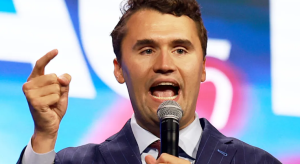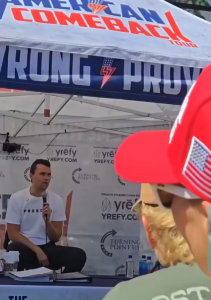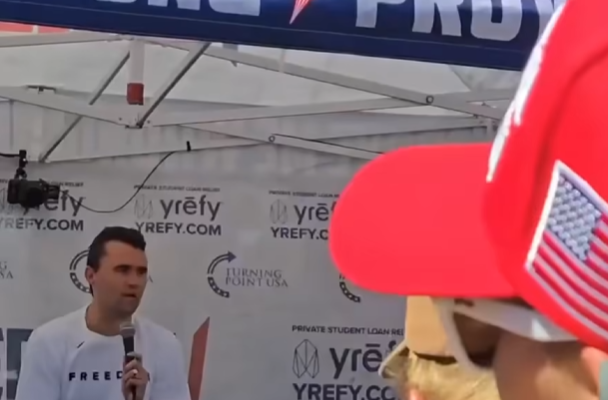Charlie Kirk’s Assassination: A Tragedy in the Age of Viral Violence
On September 10, 2025, the American political landscape was shaken by a moment of brutal clarity. Charlie Kirk, the 31-year-old founder of Turning Point USA and a prominent right-wing activist, was shot in the neck during a live event at Utah Valley University. The shooting, captured from multiple angles by attendees’ smartphones, spread across social media platforms within minutes. The footage—graphic, visceral, and deeply disturbing—has ignited a national conversation not only about political violence, but about the role of media, trauma, and the ethics of digital spectatorship.
The Moment That Changed Everything
Kirk was speaking under a white tent emblazoned with slogans like “The American Comeback” and “Prove Me Wrong” as part of his campus tour. According to eyewitness accounts, he had just responded to a student’s question about mass shooters when a single gunshot rang out. The bullet struck the left side of his neck. Kirk’s head snapped backward, and he slumped from his chair as screams erupted and the crowd scattered.
The scene was chaotic. Livestreams captured the panic, the blood, and the stunned silence that followed. Within minutes, clips of the shooting were circulating on X (formerly Twitter), TikTok, Instagram, YouTube, and even Truth Social, where President Donald Trump confirmed Kirk’s death.
The Collapse of Gatekeeping
For over a century, traditional media outlets have served as gatekeepers, deciding which images and words are appropriate for public consumption. But in the age of smartphones and social media, that gatekeeping has all but collapsed. While legacy news organizations blurred or omitted the moment of impact, millions of users had already seen it—some in slow motion, some looped endlessly.
This democratization of content has profound implications. On one hand, it allows for transparency and immediacy. On the other, it exposes viewers—especially young people—to trauma without warning. “I wish I didn’t see it,” said Charlotte Morgan, a student at the University of Hawaii. “It made me feel sick right after I saw it”.
Mental health experts warn that viewing such graphic violence can trigger fear responses and long-term psychological effects. Britt Young, a licensed therapist, explained that the brain’s amygdala activates during traumatic viewing, releasing stress hormones that can linger for days.
A Nation in Shock
Charlie Kirk’s assassination is more than a personal tragedy—it’s a political earthquake. As the face of Turning Point USA, Kirk was a rising star in conservative circles, known for his combative style and youth outreach. His death has prompted an outpouring of grief from allies and opponents alike.
Senator Mike Lee of Utah tweeted, “Please join me in praying for Charlie Kirk and the students gathered there”. Representative Marjorie Taylor Greene shared footage of the shooting, sparking debate about whether such content should be amplified or suppressed.
The university initially reported that a suspect was in custody, but later clarified that the person detained was not the shooter. As of this writing, the investigation remains ongoing, and the motive behind the attack is still unclear.
The Ethics of Sharing
The viral spread of Kirk’s shooting raises urgent questions about digital ethics. Should graphic content be shared at all? If so, under what conditions? Platforms like YouTube and Meta have responded by restricting access to the footage, applying age filters and warning labels. Yet these measures are often too late. Once a video is online, it’s nearly impossible to contain.
Some users have called for restraint. “For the love of God and Charlie’s family,” one post read, “just stop”. Others argue that such footage is necessary to document reality and hold perpetrators accountable.
This tension—between visibility and sensitivity—reflects a broader cultural shift. We live in an era where tragedy is not just witnessed but consumed, dissected, and debated in real time. The line between journalism and voyeurism grows thinner by the day.
Legacy Interrupted
Charlie Kirk’s death interrupts a career marked by controversy and charisma. As the founder of Turning Point USA, he built a platform that energized young conservatives and challenged liberal orthodoxy on college campuses. His “America Comeback Tour” was designed to rally support for traditional values and free speech.
Critics often accused Kirk of inflammatory rhetoric, but even they acknowledge his influence. He was a skilled communicator, adept at turning viral moments into political capital. That his final moments were themselves captured in a viral video is a tragic irony.
Kirk’s legacy will be debated for years to come. Was he a provocateur or a patriot? A divisive figure or a visionary? What’s certain is that his death has left a void in conservative activism—and a scar on the national psyche.
A Call for Reflection
In the aftermath of Kirk’s assassination, America faces a reckoning. Political violence is not new, but its visibility has reached unprecedented levels. The question now is how we respond—not just as individuals, but as a society.
Do we honor Kirk’s memory by amplifying his message, or by seeking unity across ideological divides? Do we demand accountability from tech platforms, or accept the chaos of unfiltered media? Do we shield our children from trauma, or prepare them for a world where violence is a click away?
There are no easy answers. But perhaps the most important step is to pause. To mourn. To reflect. To remember that behind every viral clip is a human life—complex, flawed, and irreplaceable.
Conclusion: The Price of Spectacle
Charlie Kirk’s assassination is a tragedy that transcends politics. It is a moment of rupture—a reminder that the spectacle of violence has real consequences. As we grapple with the implications of his death, we must also confront the systems that made it a public event.
In the end, Kirk’s story is not just about a man who was shot. It’s about a nation that watched. And what we choose to do next will define not only his legacy, but our own.

